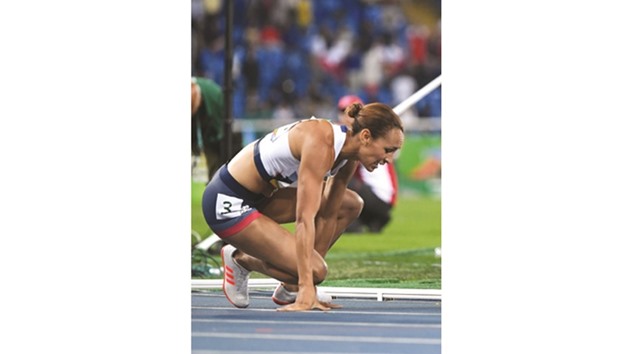British heptathlete Jessica Ennis-Hill called for a worldwide rethink on doping on Sunday after the Rio Olympics were plagued by drugs scandals including the suspension of Russia’s entire athletics team.
Ennis-Hill, speaking a day after she added a silver medal to her 2012 Olympic gold, said a vigorous testing regime needed to be “standardised across the world”.
The British star was beaten at both the 2007 and 2011 world championships by athletes who were later exposed as drug cheats.
“Definitely it needs to be reviewed,” Ennis-Hill told AFP during an appearance for Olympics timekeeper Omega at Ipanema in Rio de Janeiro.
“I think our testing system in Britain is great. We have lots of tests, we have out-of-competition tests and we’re tested really regularly and that needs to be standardised across the world.”
Ennis-Hill came up just short against Belgium’s Nafissatou Thiam, 21, late on Saturday after a battle that came down to the final event, the 800m.
World athletics chief Sebastian Coe has said he hoped fans have faith that Olympic athletics is clean, but Ennis-Hill had sympathy with their concerns.
Coe’s IAAF came down hard on the unearthing of a state-run Russian doping conspiracy, suspending the team en masse while the country cleans up its act.
Kenya, another powerhouse of the sport, also flirted with suspension and remains in the spotlight after an official was sent home from Rio over allegations he demanded bribes to warn athletes of impending drug tests.
“I can understand that fans have that element of disappointment,” said Ennis-Hill, 30. “As an athlete, I look at the sport and when I hear these stories of doping scandals it’s devastating.”
“But there are some amazing true performances, athletes have trained incredibly hard and so many athletes that you see compete here are true, performing athletes.”
“So it’s to not take that away from the athletes that are doing it right, and hope that the federations and the monitoring system within drug-testing worldwide is sorted out and cleaned up.”
Retirement ‘tough question’
The Sheffield athlete finished fourth at the Osaka world championships in 2007, before silver medallist Lyudmyla Blonska of Ukraine was banned for life a year later for her second doping offence.
She also took silver at the 2011 Daegu world championships behind Russia’s Tatyana Chernova, who was later banned for two years for doping.
Wheels are in motion to intensify the anti-drugs fight with the International Association of Athletics Federations (IAAF) planning an independent integrity unit to oversee doping and disciplinary matters.
The World Anti-Doping Agency has indicated it’s open to an update after the International Olympic Committee called for a sweeping review in the wake of the Russian crisis.
Ennis-Hill said everything needs to be on the table as athletics searches for a way forward after a torrid period in its history.
“It is for the monitoring system and for everything to be looked at. We have to put trust in the federations and people that monitor the drug-testing worldwide and hope that we find a solution,” she said.
Ennis-Hill, who spent two hours in anti-doping after Saturday’s competition “waiting to go to the toilet”, reiterated that she is undecided about whether to retire or push on to next year’s world championships in London.
“I’m not sure what my next goal is going to be,” she said, adding that returning to athletics after the birth of her son, two-year-old Reggie, had been a “huge challenge”.
“I definitely like to set goals and like to have things that I want to achieve and work towards but I’m not sure at this stage. That’s a tough question.”

Jessica Ennis-Hill
